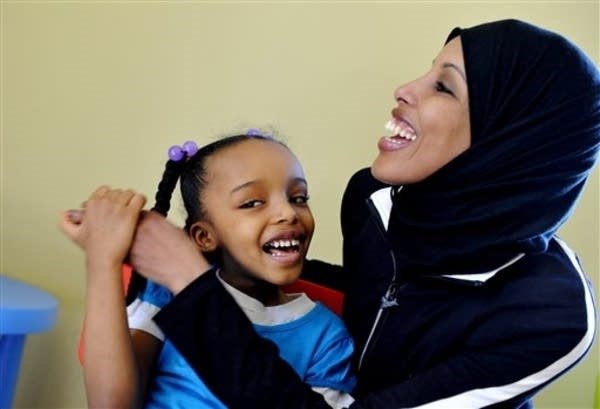
Thursday August 29, 2024
By William Bornhoft
This summer's measles outbreak is largely affecting unvaccinated children in the Somali community, the Minnesota Department of Health said.

FILE - In this March 29, 2011 photo, Hodan Hassan is shown at her Minneapolis home with her daughter Geni, 6, who has autism. Health officials struggling to contain a measles outbreak that's hit hard in Minneapolis' large Somali community are running into resistance from parents who fear the vaccine could give their children autism.Jim Mone/AP
TWIN CITIES, MN — Amid the growing measles outbreak, Minnesota health officials are urgently calling on Twin Cities parents — especially within the Somali community — to vaccinate their children before the disease spreads further.
The outbreak is predominantly impacting unvaccinated children in Minnesota's Somali community, where persistent vaccine myths continue to spread, according to the Minnesota Department of Health.
"Some families seem concerned that the MMR vaccine is somehow linked to autism, but this is a myth," said Dr. Abdul Abdi, a pediatrician at Children's Minnesota, in a news release.
"Regrettably, vaccination rates against measles have dropped significantly in our Somali community over the past 10-15 years, yet the number of autism cases have not decreased. This clearly demonstrates that there is no link between the MMR vaccine and autism."
Since May, 30 cases of measles have been reported in Minnesota.
Cases range age from 7 months to 10 years, with one case in an adult, health officials said. About a third of all cases required hospitalization.
"Measles is currently circulating, and infections can be severe," said Dr. Ruth Lynfield, state epidemiologist and medical director at MDH.
"I urge all parents to be sure that their children are vaccinated because we know that vaccination offers the best protection."
After over 50 years of use, the MMR vaccine has been shown to be safe to receive and works to prevent measles, health officials said.
The general recommendation for the MMR vaccine is for children to receive two doses: one at 12-15 months and the second at 4-6 years. The second dose can be administered earlier if needed.
Unvaccinated people exposed to measles need quarantine for 21 days, according to health officials.
It generally takes at least eight days from exposure for someone with measles to develop their first symptoms.
Early symptoms of measles include a high fever, cough, runny nose, and watery eyes. Next comes a rash that begins on the head and then spreads to the rest of the body.